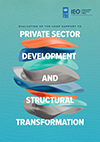
Evaluation of the UNDP Support to Private Sector Development and Structural Transformation
Output 1.1 The 2030 Agenda, Paris Agreement and other intergovernmentally-agreed frameworks integrated in national and local development plans, measures to accelerate progress put in place, and budgets and progress assessed using data-driven solutions
Output 2.1 Open, agile, accountable and future-ready governance systems in place to co-create and deliver solutions to accelerate SDG achievement
Output 2.2 Civic space and access to justice expanded, racism and discrimination addressed, and rule of law, human rights and equity strengthened
Output 4.1 Natural resources protected and managed to enhance sustainable productivity and livelihoods
Output 4.2 Public and private investment mechanisms mobilized for biodiversity, water, oceans, and?climate solutions
Output 5.1 Energy gap closed
Output 5.2 Transition to renewable energy accelerated capitalizing on technological gains, clean energy innovations and new financing mechanisms to support green recovery
Output 6.1 Country-led measures implemented to achieve inclusive economies and to advance economic empowerment of women in all their diversity, including in crisis contexts
Output 6.2 Women’s leadership and participation advanced through implementing affirmative measures, strengthening institutions and civil society, and addressing structural barriers, in order to advance gender equality, including in crisis contexts
Output E.2 Innovation capabilities built, and approaches adopted to expand policy options at global, regional, national and sub-national levels
Output E.3 Public and private financing for the achievement of the SDGs expanded at global, regional, and national levels
Goal 7. Ensure access to affordable, reliable, sustainable and modern energy for all
Goal 12. Ensure sustainable consumption and production patterns
7.1 By 2030, ensure universal access to affordable, reliable and modern energy services
7.2 By 2030, increase substantially the share of renewable energy in the global energy mix
7.3 By 2030, double the global rate of improvement in energy efficiency
7.a By 2030, enhance international cooperation to facilitate access to clean energy research and technology, including renewable energy, energy efficiency and advanced and cleaner fossil-fuel technology, and promote investment in energy infrastructure and clean energy technology
7.b By 2030, expand infrastructure and upgrade technology for supplying modern and sustainable energy services for all in developing countries, in particular least developed countries, small island developing States and landlocked developing countries, in accordance with their respective programmes of support
12.1 Implement the 10-Year Framework of Programmes on Sustainable Consumption and Production Patterns, all countries taking action, with developed countries taking the lead, taking into account the development and capabilities of developing countries
12.2 By 2030, achieve the sustainable management and efficient use of natural resources
12.3 By 2030, halve per capita global food waste at the retail and consumer levels and reduce food losses along production and supply chains, including post-harvest losses
12.4 By 2020, achieve the environmentally sound management of chemicals and all wastes throughout their life cycle, in accordance with agreed international frameworks, and significantly reduce their release to air, water and soil in order to minimize their adverse impacts on human health and the environment
12.5 By 2030, substantially reduce waste generation through prevention, reduction, recycling and reuse
12.6 Encourage companies, especially large and transnational companies, to adopt sustainable practices and to integrate sustainability information into their reporting cycle
12.7 Promote public procurement practices that are sustainable, in accordance with national policies and priorities
12.8 By 2030, ensure that people everywhere have the relevant information and awareness for sustainable development and lifestyles in harmony with nature
12.a Support developing countries to strengthen their scientific and technological capacity to move towards more sustainable patterns of consumption and production
12.b Develop and implement tools to monitor sustainable development impacts for sustainable tourism that creates jobs and promotes local culture and products
12.c Rationalize inefficient fossil-fuel subsidies that encourage wasteful consumption by removing market distortions, in accordance with national circumstances, including by restructuring taxation and phasing out those harmful subsidies, where they exist, to reflect their environmental impacts, taking fully into account the specific needs and conditions of developing countries and minimizing the possible adverse impacts on their development in a manner that protects the poor and the affected communities


